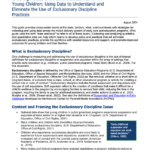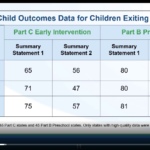This tool provides a timeline of common activities that state and local Part B preschool programs undertake to collect and use early childhood outcomes data. The tool presents activities essential for federal reporting as well as other best practices.
Tag Archives: Age 3-5
Ensuring Positive Outcomes for All Young Children: Using Data to Understand and Eliminate the Use of Exclusionary Discipline Practices

This guide provides cross-sector teams at the state, territory, tribal, and local levels with strategies for collecting and using data across the mixed delivery system of early care and education programs.
What we Need to Know to Understand The Scope of Exclusionary Discipline

Conference: Early Childhood Inclusion Institute Date: May 2023 Presenters: Grace Kelley, Ginger Elliott-Teague, Sally Shepherd A facilitated discussion among participants to map a path to improving understanding of the scope […]
Early Childhood Results Matter: Understanding Preschool Child Outcomes Data

Conference: NASDSE Date: October 2023 Presenters: Nicholas Ortiz In this presentation from the 2023 NASDSE Conference, DaSy/ECTA staff provide an overview of the preschool child outcomes data, including the rationale […]
OSEP Part B 619 Child Find Self-Assessment (CFSA)
OSEP, with the collaboration and support of ECTA Center and DaSy Center (for Sections II and III), developed this voluntary self-assessment tool to help Local Education Agencies (LEAs) strengthen their child find system with the goal of ensuring children eligible for special education and related services are referred and enrolled.
Data System Disruptions: Preparation and Response Considerations Webinar

October 27, 2022. Events or circumstances that disrupt use of a state Part C or Part B 619 data system can negatively impact program operations, management, and accountability.
Data System Disruptions Brief: Preparation and Response Considerations for Part C and Part B 619 Leaders

October 2022. This resource is intended to help Part C and Part B 619 leaders understand, prepare for, and respond to various types of data system disruptions. Part C and Part B 619 programs rely on their data systems to support everyday operations. Many states have experienced an event or circumstance that has limited or restricted their data system(s) from being accessed or used as planned. Disruptions to a state’s data system may jeopardize access to accurate information required to meet a wide range of data use needs.
Data Governance Webinar: How Prepared Are You?

October 3, 2022 Presenters: Bruce Bull & Nicholas Ortiz As state agencies increasingly use data for multiple purposes, data governance becomes essential to ensure that clear policies and procedures are […]
IFSP Information Toolkit

This DaSy toolkit provides resources to support decision-making for states that wish to develop or enhance an IDEA Part C data system. The toolkit details data system features such as delivered services, electronic signatures, parent portals, dashboards, and notification systems.
FFY 2017 Child and Family Outcomes Data Highlights

November 22, 2019 Webinar Recording Webinar Slides The ECTA and DaSy Center staff have completed their national child and family outcomes data analysis. They discuss the national performance data for […]

